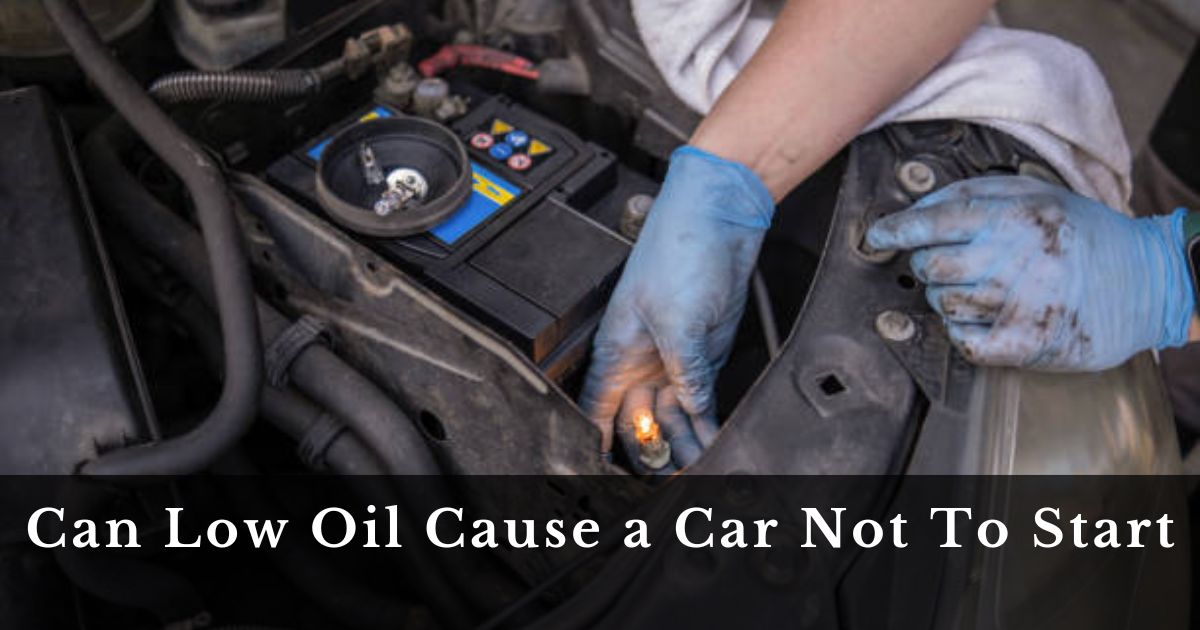Can low oil cause a car not to start, If your car has ever refused to start, you know how frustrating it is. There are many reasons for this problem, but is low oil one of them? It’s important for every car owner to know how oil levels can affect starting the car.
Can Low Oil Cause a Car Not to Start?
Introduction
When it comes to keeping your car running smoothly, engine oil plays a vital role. But can having low oil actually prevent your car from starting? In this article, we’ll explore the importance of engine oil, what happens when it’s low, and how it can affect your car’s ability to start.
Understanding Engine Oil
What is Engine Oil?
Engine oil is a lubricant that keeps the various parts of your car’s engine running smoothly. It reduces friction, cools the engine, and helps keep it clean.
Functions of Engine Oil
Lubrication: Prevents metal parts from grinding against each other.
Cooling: Helps dissipate heat.
Cleaning: Removes sludge and deposits.
Protection: Forms a protective barrier against corrosion.
Symptoms of Low Engine Oil
Common Signs
Oil Warning Light: The oil warning light on your dashboard will come on.
Strange Noises: Grinding or ticking sounds from the engine.
Overheating: Engine temperature gauge rises unusually high.
Causes of Low Engine Oil
Oil Leaks
Oil can leak from various parts of the engine due to worn-out seals or gaskets.
Poor Maintenance
Neglecting regular oil changes can lead to low oil levels and degraded oil quality.
Can Low Oil Cause a Car Not to Start?
Direct vs. Indirect Effects
Low oil by itself typically doesn’t prevent the car from starting. However, the indirect effects, such as damage to engine components, can.
Scenarios Where Low Oil Prevents Starting
Seized Engine: If the engine components have been damaged due to lack of lubrication, the engine might seize, preventing it from starting.
Oil Pump Failure: Low oil can cause the oil pump to fail, which can stop the engine from starting.
Engine Components Affected by Low Oil
Oil Pump
The oil pump is essential for circulating oil throughout the engine. Without enough oil, it can fail.
Crankshaft
The crankshaft relies on oil for lubrication. Low oil can cause it to wear out or even break.
Pistons and Cylinders
Insufficient oil can lead to excessive wear on the pistons and cylinders, causing severe engine damage.
How Oil Pressure Affects Starting
Role of Oil Pressure
Oil pressure ensures that oil reaches all parts of the engine. Low oil levels result in low oil pressure, which can cause the engine to perform poorly or fail to start.
Consequences of Low Oil Pressure
Low oil pressure can lead to:
Overheating
Increased friction
Engine component damage
Preventing Low Oil Levels
Regular Oil Checks
Make it a habit to check your oil level regularly, at least once a month.
Scheduled Maintenance
Follow your car manufacturer’s maintenance schedule for oil changes and inspections.
How to Check Your Oil Level
Step-by-Step Guide
Park on Level Ground: Ensure your car is on a flat surface.
Turn Off the Engine: Wait a few minutes after turning off the engine.
Locate the Dipstick: Usually found near the engine.
Pull Out the Dipstick: Wipe it clean with a rag.
Reinsert and Pull Out Again: Check the oil level indicated on the dipstick.
Tools Needed
Clean rag or paper towel
Oil dipstick
What to Do If Your Oil Is Low
Immediate Actions
Add Oil: Use the recommended oil type and add until it reaches the proper level.
Inspect for Leaks: Check for any visible signs of oil leaks.
Long-term Solutions
Regular Maintenance: Keep up with oil changes and inspections.
Professional Inspection: Have a mechanic check for underlying issues if low oil persists.
Common Misconceptions About Engine Oil
Myths Debunked
“Oil Never Needs Changing”: Oil degrades over time and loses its effectiveness.
“Any Oil Will Do”: Using the wrong oil type can harm your engine.
Facts About Oil and Car Performance
Quality Matters: High-quality oil provides better protection.
Frequency of Changes: Follow manufacturer guidelines for oil change intervals.
Importance of Using the Right Oil
Types of Oil
Conventional Oil: Suitable for older vehicles.
Synthetic Oil: Offers better performance and protection.
Manufacturer Recommendations
Always use the oil type specified in your car’s owner manual.
When to Seek Professional Help
Signs You Need a Mechanic
Persistent low oil levels
Unusual engine noises
Oil warning light stays on
Choosing the Right Service Center
Look for certified mechanics with good reviews and reasonable prices.
Keeping your engine oil at the right level is crucial for the health of your car. While low oil might not directly prevent your car from starting, the resulting damage can. Regular maintenance and using the correct oil type are key to avoiding these issues.
While low oil itself doesn’t typically prevent a car from starting, it can lead to conditions that do. Maintaining the proper oil level is crucial for the health of your engine and can prevent a range of issues, including starting problems. Regular maintenance and being aware of the symptoms of low oil can save you from costly repairs and ensure your car runs smoothly.
FAQs
Can low oil cause engine damage?
Yes, low oil can cause significant engine damage due to lack of lubrication.
How often should I check my oil level?
Check your oil level at least once a month.
What type of oil is for my car?
Refer to your car’s owner manual for the recommended oil type.
What happens if I drive with low oil?
Driving with low oil can lead to engine overheating, increased friction, and severe damage.
Can synthetic oil help prevent low oil problems?
Synthetic oil can offer better performance and longer intervals between changes, potentially reducing low oil issues.



